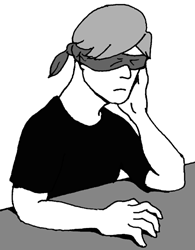![[Metroactive Features]](/features/gifs/feat468.gif)
[ Features Index | Silicon Valley | Metroactive Home | Archives ]
Obscene Community
By Annalee Newitz
HERE'S YET another wacky fact you probably didn't know about the Communications Decency Act (CDA) that ole Bill Clinton signed into law way back in 1996: the good citizens of some small town in Arizona or Southern California might have the power to send you to jail if they think the contents of your website are "obscene." Currently, the CDA contains a section that makes it illegal for people to make or post on the Internet "any comment, request, suggestion, proposal, image or other communication which is obscene, knowing that the recipient of the communication is under 18 years of age, regardless of whether the maker of such communication initiated the communication."
There are two major problems with this part of the CDA. First, it assumes that people on the Internet can control who sees what they post on websites or in newsgroups. Right now, it's just not technically possible to screen web surfers by age or anything else. Second, and more disturbingly, the CDA doesn't define what "obscene" might be. Currently, the only definitions offered refer to "local community standards," a phrase drawn from previous Supreme Court decisions that relied upon the values of particular geographic regions define "local community standards." Obviously, this definition is meaningless on the Internet, where Skippy from Massachusetts might post a picture of himself humping his kitchen appliances on a web server operated out of Florida, which would then be downloaded by an eager Betty Crocker fetishist in Idaho.
Translated into a real-life scenario, the CDA language in question here means that somebody like New York artist Barbara Nitke (www.barbaranitke.com), whose website displays her erotic art, could be sent to jail if somebody under 18 happens to visit her website. This is precisely the scenario that members of the National Coalition for Sexual Freedom (NCSF) in Washington, D.C., fear most. To prevent the Ashcroft court from setting repressive precedents with this little-known part of the CDA, the NCSF and Nitke have gone on the offensive. In mid-December, they filed a legal complaint with the federal district court of southern New York that argues the language about "obscenity" in the CDA is unconstitutionally vague and will having a chilling effect on free speech.
As NCSF executive director Judy Guerin told me last week, this case is just one of several that the NCSF is planning, including ones that challenge digital surveillance sections of the USA-Patriot Act. Guerin, whose organization was formed in 1997, says that we're at a crucial juncture in American politics right now. With Ashcroft in power, we're likely to see an increase in obscenity trials--the attorney general has a record of extreme conservatism in cases like these. At the same time, civil liberties groups like the NCSF worry that Ashcroft will use the "war on terror" to refuse to hear appeals in obscenity cases, since their outcomes have no bearing on our current state of national emergency.
"We think American society has made tremendous strides in how we think about sex and sexuality," Guerin says. "And we're concerned that this ultraconservative regime is going to set us back. We need to be aggressive and proactive to prevent society from reverting under the current conservative administration." Guerin adds that the Nitke case will almost certainly come before the Supreme Court. "Unlike most cases where you have to ask permission to be heard before the Supreme Court, the CDA gives us an automatic right of appeal to the Supreme Court." If the federal district court finds the CDA unconstitutional, Ashcroft will probably fight it, and if the CDA isn't found unconstitutional, the NCSF will appeal to the Supreme Court.
Such a case, like many in the courts right now, will determine a great deal about the future of online content. It could set a precedent for how "local community standards" are defined in a world where community has nothing to do with geographic locality. Moreover, this case could become the first in the Supreme Court to grapple directly with the nature of "obscenity" online. Ironically, our most technologically advanced method of communication, the Internet, could become the means by which antiquated social values are disseminated on a global scale. Or it might propel us into a cultural future we never imagined. I'm not sure yet if that's a good thing or not.
[ Silicon Valley | Metroactive Home | Archives ]
Copyright © Metro Publishing Inc. Metroactive is affiliated with the Boulevards Network.
For more information about the San Jose/Silicon Valley area, visit sanjose.com.
![]()

Annalee Newitz ([email protected]) is a surly media nerd who thinks everything has at least a little social, literary, artistic or political merit.
From the January 17-23, 2002 issue of Metro, Silicon Valley's Weekly Newspaper.